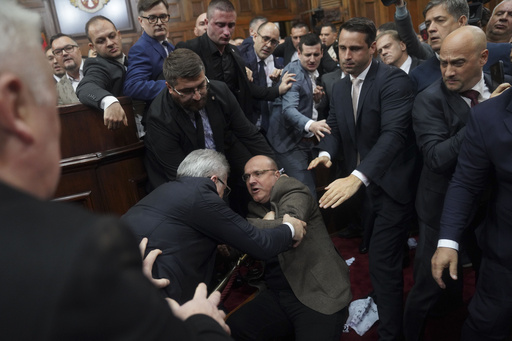
BELGRADE, Serbia — On Monday, Serbia’s parliament witnessed violent clashes between members of the ruling party and opposition lawmakers, following a tragic event that left 15 people dead due to a roof collapse at a train station in Novi Sad on November 1.
The opposition was intent on holding discussions regarding accountability for the incident, while the ruling party sought to proceed with the approval of the state budget for the upcoming year, backed by their majority in the parliament.
During the heated exchanges, opposition members displayed a banner featuring a red handprint with the message “blood is on your hands,” countered by the ruling party’s banner, which accused the opposition of desiring “war while Serbia wants to work.”
Tensions escalated into physical altercations as both sides scrambled to seize control of each other’s banners.
Ana Brnabic, the speaker of the parliament, quickly condemned the opposition, accusing them of attempting to destabilize the government with external support and of plotting to seize power through disorderly means.
“There is not a hint, not a grain of doubt that these are people who are well-organized, well-trained, and I believe they’re being compensated well to create chaos in Serbia,” she stated.
President Aleksandar Vucic, known for his authoritarian leadership style, took to Instagram to declare that the “daily bullying” and “savage behavior” exhibited by the opposition would not be tolerated.
“I want to reassure the citizens that we will respond to their rudeness, rudeness, and arrogance with even more work in the future,” Vucic said, adding that the opposition would not prevent pensioners from receiving their increased pensions or public sector employees from securing their raised salaries.
Opposition leader Dragan Djilas criticized the speaker for effectively “shutting down” parliamentary debate by rejecting a request from over 80 opposition members to discuss who bears responsibility for the railway disaster.
“She started with that when she refused to put on the agenda the request for a government confidence debate due to the murder and crime in Novi Sad,” Djilas remarked.
The disastrous incident has heightened tensions throughout the Balkan region, resulting in public outrage directed toward the government, and prompting protests.
The train station, a crucial transportation hub, had recently undergone renovations under a partnership involving Serbia and China. Critics assert that a combination of corruption, a lack of oversight, and poor construction practices contributed to the catastrophic event.
The incident has become a significant point of contention, symbolizing widespread discontent with Serbia’s authoritarian governance and illustrating the growing public demand for transparency, especially as the country continues to engage in substantial infrastructure projects primarily handled by Chinese state enterprises.
